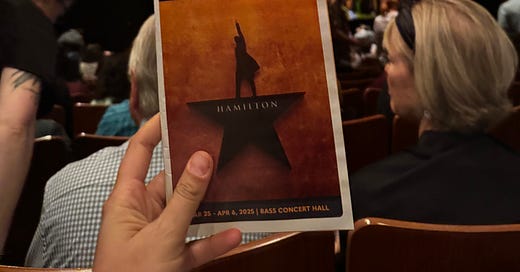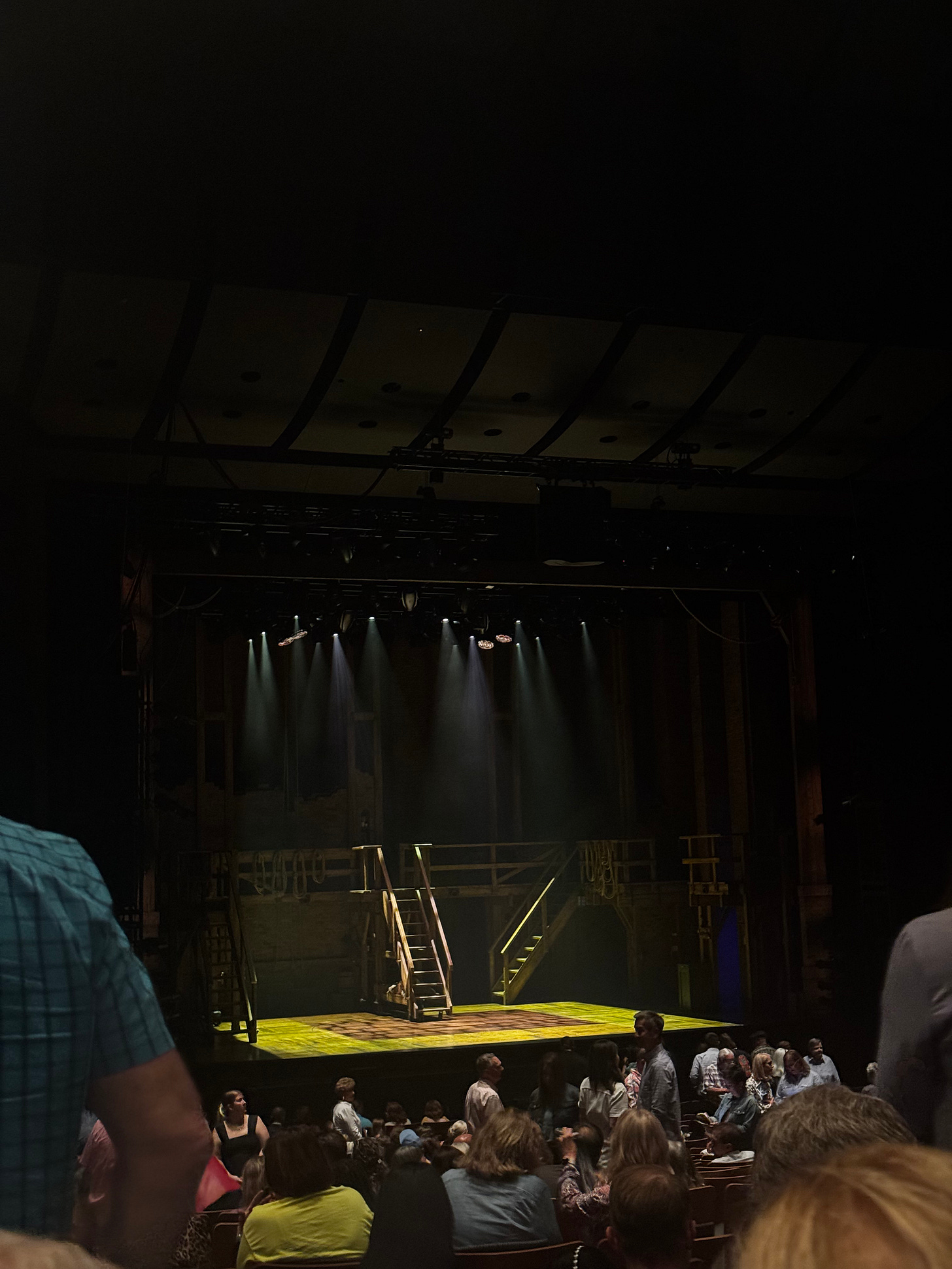“How was Hamilton?” Texas Performing Arts asked in an email last week. Short answer: it was great. Here is the long answer:
I first heard about Hamilton in the last year of Obama’s presidency. A college friend told me about a diverse history musical but I didn’t get it. “How can you enjoy a musical’s soundtrack without seeing the musical,” I remember thinking. We listen and we don't judge– I swear I have grown.
The first Hamilton craze was something to behold. Lin-Manuel Miranda, Daveed Diggs, Jonathan Groff, and Leslie Odom Jr. were everywhere from Blackish to the White House. (Can we get another season of Mindhunter already!) In 2016, Hamilton was obnoxiously hard to avoid.
I finally saw it when the original cast recording dropped on Disney+ in 2020. It coincided with preparation for my graduate school history comprehensive exams. I was both writing and running out of time.
On March 25th, I saw the famous rotating stage in person for the first time at Bass Concert Hall in Austin, TX.
Despite changing public sentiment re: America’s founding fathers, I’d argue Hamilton remains a beautiful piece of art with incredible actors, a historically and culturally subversive commentary on musical theater that centers BIPOC actors, and finally, a contributor to the historical dialogue concerning national values. (Historically accurate? Meh…) As a public historian, Hamilton does what many of us dream of doing: it draws the public in like bees to honey. History is accessible, relatable, compelling, and human.
The show was stunning. I have zero regrets about buying a ticket months in advance.
“The Story of Tonight” was the first track to put me at ease. It features Hamilton, Mulligan, Laurens, and Lafayette drunkenly singing and rocking to…
Raise a glass to the four of us
Tomorrow, there'll be more of us
I raised my overpriced IPA as if to cheer with them.
George Washington, played by A. D. Weaver, blew me away. His voice had a rich, resonant depth. Alternating between speaking and singing, each note held a rugged beauty — unyielding. It was the kind of voice that wrapped around you. It carried a genealogy of melodies with it.
Now to Angelica Schuyler: the eldest daughter caught in a will-they-won't-they with her sister’s husband. The sexual tension-to-”comma sexting” pipeline. Classic.
My dearest, Angelica…
Renée Elise Goldsberry won a Tony for her portrayal of the character in 2016. The lyrical chaos of Satisfied is enough to stun a Broadway nubie. In the 2025 National Tour, Marja Harmon is spectacular. Her voice is complex and hearty, though in places she alternates between stern and soft – what else would you expect from the eldest Schuyler sister?
The cast thoughtfully balanced what I can only assume is an intense pressure to conform to the all-familiar vocal runs of the original cast with their own artistic creativity and audience awareness. The eruption of Wicked to the even more popular mainstream introduced me to the very vocal way some audiences don’t appreciate the individuality of performers.
Jefferson’s playful ignorance upon returning to the United States seemed to be an audience favorite. I’ve struggled with this character for a long time. I’ve spent enough mental time in the nineteenth century– I do NOT want to root for Thomas Jefferson.
But I’m sorry – what‘d I miss? The national tour has a darkskin Jefferson?! Yes, please!
Burr and Eliza feel like moons to Hamilton’s earth in the structure of the show, yet, they get the final word. The actors are compelling and consistent. Riveting. Nowhere is the humanity of the characters clearer than in Burr and Eliza’s longing to be seen. Eliza’s wail at the death of her son, Philip, cleared out my tear ducts. Is someone cutting onions in here?
Concurrent critiques of the Obama administration and Hamilton reflected the time: the neoliberals are at it again, making just enough Black content to satisfy the BIPOC. *eyeroll* A Performance Studies article argued that Hamilton upheld “nationalist neoliberal multicultural inclusion” in a way that ”appealed to both Obama and Cheney, Democrats and Republicans.”(Donatella Galella. Being in “The Room Where it Happens.” 2018) Fair. Hamilton has been on the receiving end of critiques like this for a while.
The horrifying duality of Jefferson and Washington’s slave-owning and simultaneous centrality to the birth of the nation is acknowledged. (Is the new nation in the room with us?!)This duality is brought to the fore when the deep skintones of the actors are reflected in the auditorium light. “What of Jefferson’s relationship to Sally Hemmings?!” a voice in my head screams, “And Washington’s teeth!” Was this the type of subversion Lin-Manuel intended by having a cast made up of people of color?
There's a letter on my desk from the President
Haven't even put my bags down yet
Sally be a lamb, darlin', won't cha open it?
Barf. There is a clear gap in holding these cherished characters accountable that I hesitate to assign responsibility to Hamilton to address. But I also fear the audience won’t do the work either. Maybe it's my job as a public historian then?
Immigrants, we get the job done!
“Mmmmmmm,” the person sitting next to me stated.
As a fan of the show, and historian, it was uncomfortable and refreshing. I don’t know if it is because I’m rooting for everybody Black or the brilliance of the show.
Times have changed. However, living through a second Trump Presidency presents a new role for Hamilton to play.
History Has Its Eyes on You
In the discipline of history, we talk a lot about historical memory and the idea of "memory making." History as a malleable idea exists as much as the facts of the past as we know them. In this context, historical memory is the way people or groups create narratives about past events. These narratives are often shaped by their personal, cultural, or national values, which in turn shape how we remember and understand the past.
Think of Confederate statues. In the Reconstruction Era, Americans generally agreed the Confederacy wasn’t great. In the early 20th century, monuments sprung up across the South to commemorate Confederate soldiers. In the 2010s and 2020s, American culture more broadly started to reassess the relevance of those interpretations of history to our lives. The facts of the Civil War remain the same, however, what those facts mean to certain populations is revisited and evolves in each generation.
In other words, historical memory is made up of the ideas that shape how we think about the past, and memory-making is the process by which those ideas are made.
In my mind, Hamilton continues to be made and remade, and like great art, it provides new things for a new time.
The last thought I’ll end with is this –
In the summer of 2020, the pandemic shattered my and other graduate students’ ability to conduct in-person research for our respective projects. At the same time, national protests forced institutions to consider their stance on the Movement for Black Lives. My department held a meeting to talk about ways it would support its Black graduate students. A colleague, now Professor, Tiana Wilson, said something that has stayed with me since: words are great, but what are you doing to help the material lives of Black folks (paraphrased.)
I say this strictly from the perspective of an audience member, but Hamilton does that. In all their excellence, the show puts actors of color on center stage and lets them shine. What happens beyond the stage—how we receive, critique, and build on that—is in our hands.
Under an administration hellbent on erasing DEI, Hamilton feels more political now than ever before.

Books about the early years of the Republic that aren’t about Hamilton:
Firsting and Lasting by Jean O'Brien
Violence over the Land by Ned Blackhawk
They Were Her Property: White Women as Slave Owners in the American South by Stephanie E. Jones-Rogers
The Price for Their Pound of Flesh by Daina Ramey Berry
Changes in the Land by William Cronon
Soul by Soul: Life Inside the Antebellum Slave Market by Walter Johnson
Our Beloved Kin: A New History of King Philip's War by Lisa Brooks
Black on Both Sides: A Racial History of Trans Identity by C. Riley Snorton
Bibliography
Galella, Donatella. “Being in ‘The Room Where It Happens’: Hamilton, Obama, and Nationalist Neoliberal Multicultural Inclusion.” Theatre Survey 59, no. 3 (2018): 363–85. https://doi-org.ezproxy.lib.utexas.edu/10.1017/S0040557418000303.
Wakim, Marielle. “You Can’t Possibly Understand the Genius of Hamilton Until You Understand ‘Comma Sexting’: Decoding One of the Musical’s Nerdiest Lyrics.” Los Angeles Magazine, July 15, 2016. https://lamag.com/music/you-cant-possibly-understand-the-genius-of-hamilton-until-you-understand-comma-sexting.
Hamilton National Tour. March 25, 2025. Bass Concert Hall, Austin, TX.







I don't know why, but for a moment I thought this essay was going to make the case that there should be a Hamilton style play about trump and the Trump era - written and performed by BIPOC actors lol. That idea is still tickling me, but instead what I read was equally interesting. Nice work!